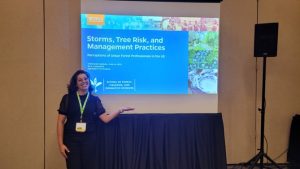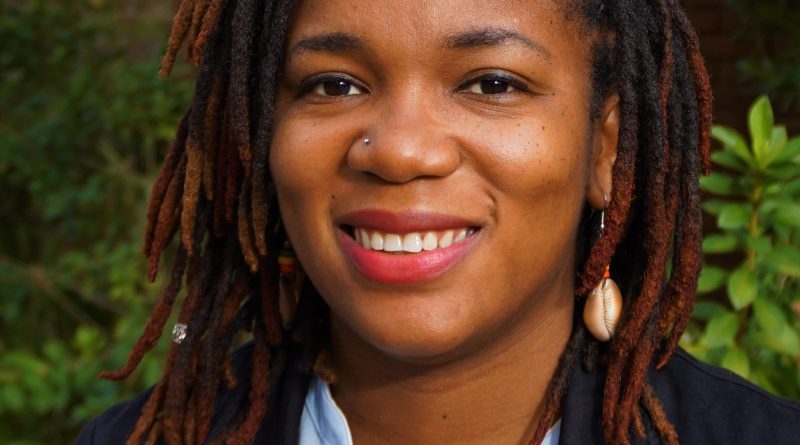Enhancing collaboration amongst urban forest stakeholders – An assessment of natural hazard risk perceptions in relation to the services and disservices of city trees
2020| Mysha Clarke, PhD, University of Florida, Co-PIs Lara Roman, PhD, USDA Forest Service, Tenley Conway, PhD, University of Toronto-Mississauga, Theodore Eisenman, PhD, University of Massachusetts-Amherts, Andrew Koeser, PhD, University of Florida
Urban areas face increased threats from climate-related natural hazards like tropical storms, ice storms, hurricanes, and floods. The impacts of hurricanes and floods are concerning because storm events are compounded by aging infrastructure, rapid urbanization, and high population density at lower elevations in U.S. cities. To help mitigate these threats, we will assess current risk perceptions about urban trees in relation to major storm events in Boston (MA), Philadelphia (PA) and Ft. Lauderdale/Broward County (FL), which are all along the Atlantic hurricane belt, with the northern cities also subject to blizzards and ice storms. Urban forests are multi-stakeholder governance systems, with varied risk perspectives among policy makers, utility workers, engineers, municipal arborists, private consulting foresters and the public. Risk perceptions are socially constructed via personal, cultural, and socio-ecological contexts. It is therefore critical that urban forest governance, including maintenance, care and related collaborations among stakeholders, assess diverse opinions about risk at the personal and institutional levels, and examine how these perspectives on ecosystem services and disservices impact urban forest governance and collaboration related to hazard preparedness.
We will use a mixed methods approach (both qualitative and quantitative methods) to conduct a comparative assessment of risk perceptions among professionals that work with, care for, and communicate about urban trees. We will assess: 1) What are the risk perceptions of diverse urban forestry stakeholders? 2) What are stakeholders’ perceptions of the ecosystem services and disservices of urban trees, especially using trees in resiliency planning? and 3) What are best practices for urban forestry stakeholders to collaborate and communicate about the risks and benefits associated with trees and storms? The results of this study will produce manuscripts for peer-reviewed journal publications, workshop in each city for urban forestry professionals, framework for collaboration and other Extension outputs including articles in Arborist News and conference presentations.
FINAL OUTCOMES:
The purpose of this research is to assess collaboration and conflict among urban forestry professionals including how they prepare and respond to storm events, risk perceptions, capacity, and efficacy beliefs. We completed semi-structured interviews with 19 professionals including municipal foresters, utility workers, and non-profit and volunteer-based leaders and emergency managers in four cities in the United States: Philadelphia, PA, Minneapolis, MN, Jacksonville, FL and Boston, MA. The interview protocol was reviewed and approved by the Ethical Review Board at the University of Florida. Each interview was recorded with the consent of the interviewees and transcribed verbatim. After transcribing the interviews and completing intercoder reliability, we used NVivo QSR software for qualitative data analysis. Our results highlight that these urban forestry professionals have diverse and sometimes contrasting goals, priorities, approaches and risk perceptions regarding trees and urban forests. Urban forestry professionals encounter various complex challenges in dealing with storm preparedness and response. The complexity of these decisions also impacts whether they perceive high or low self and collective efficacy when managing storms. The most common challenges of storm preparedness include interruptions to work schedule and workflow and insufficient staff. Specifically, managers emphasized that a proactive approach to storm preparedness was most effective but acknowledged their limited resources. Our interviewees also echo the legacy impacts of aging infrastructure, access to work sites, and diverse agency goals which make tree management for storms more demanding. These constraints further limit collaboration efforts and presents an opportunity to strengthen communication, dialogue and cooperation between the various professionals and their respective agencies/departments/organizations to better prepare these cities for future storm events.
The second phase of this project collected survey data from 921 urban forestry professionals in the U.S. in 2023. We are still doing preliminary data analyses. To date, most respondents identified as commercial arborists (25%), city forester or municipal arborist (24%), consulting arborist (21%), utility forester or arborist (11%), non-profit coordinator or program manager (3%), or other (16%). Fifty-six percent of respondents reported that their institution, organization, or agency have a storm preparedness plan. The biggest challenges respondents’ organization/agency/institution/company experienced when dealing with storm events and urban tree management include: 1) interruption of regular work, 2) insufficient staff, insufficient funding, 3) public fear of trees, 4) logistics of clean-up and 5) lack of comprehensive response plan and 6) differing stakeholder goals. Over 90% of respondents agree that their organization’s work contributes to the safety of the community while 75% believe that their pruning practices are effective at reducing debris and damage from trees during storms. Most communication about storms and urban tree management to the nonexpert public occurs via speaker to individuals in the field and at job sites (35%), making presentations or outreach at designated education events (21%), or through the media (20%). Eighty-three percent of respondents agreed that collaboration with other organizations contributed to better storm response. We are still conducting analyses on the survey responses and plan to submit the research in peer-reviewed journal articles, extension journals and the AREA newsletter.
Year: 2020
Funding Duration: 2 year
Grant Program: Bob Skiera Memorial Fund Building Bridges Initiative Grant
Grant Title: Enhancing collaboration amongst urban forest stakeholders – An assessment of natural hazard risk perceptions in relation to the services and disservices of city trees
Researcher: Dr. Mysha Clarke
Key words:
Publications:
- Cadaval, S., Clarke, M., Roman, L., Conway, T., Koeser, A., Eisenman, T. (2023). Managing urban trees through storms in three United States cities. Landscape and Urban Planning. In Review.
- This first manuscript will publish the results of the semi-structured qualitative interviews in review with Landscape and Urban Planning. We plan to submit two additional manuscripts for publication in 2024 about the survey data conducted nationally with various urban forestry professionals.
- Cadaval, S. (2023, February). Assessing urban forest professionals’ perceptions on trees and storms in cities: experiences and challenges, risk, and community vulnerability. AREA Arboriculture Research and Education Academy Newsletter, 18(1).
Professional Presentations:
2021
a. Clearing the Path: Urban tree managers’ experiences with storm events, risk perceptions, and collaborative practices in three US cities. Presented at ISA 2021 International Virtual Conference. (Virtual conference). PhD student Stephanie Cadaval was the lead presenter
2022
a. Perceptions of Collaboration, Efficacy, and Risk in the Context of Storm Events among Professionally Diverse Urban Forestry Managers in the United States. Presented for Florida Urban Forestry Council Virtual Conference. February 2022. (Virtual)
b. Managing storms and urban trees: Perspectives of urban forestry professionals. Presented at International Association for Society and Natural Resources Conference. October 2022. (Virtual).
c. Storm management in cities: Urban tree professionals’ risk management practices, community engagement, and collaboration. Presented for International Society of Arboriculture Hong Kong. December 2022. (Virtual)
2023
a. Urban forestry professionals’ perceptions and storm management practices. Presented at Trees Florida Conference for the Florida Chapter of the International Society of Arboriculture. Cape Coral, Florida. June 2023.
b. Storms tree risk and management practices: Perceptions of urban forest professionals in the US. Presented at the International Association for Society and Natural Resources Conference in Portland, Maine. June 2023.
c. How urban forest professionals perceive risk & manage trees for storms. Presented at the Society of American Foresters National Conference in Sacramento, California. October 2023
For more information on this project, contact the researcher via TREE Fund at treefund@treefund.org.


